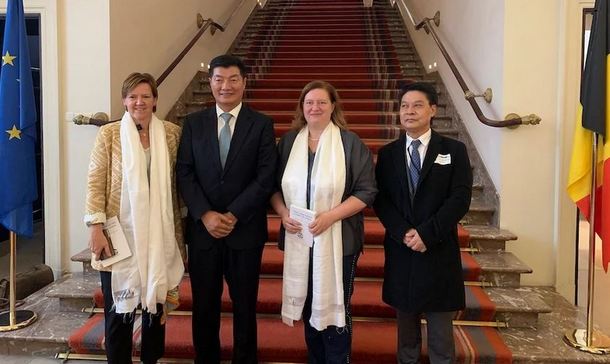Brussels—Strengthening Tibet advocacy at EU and Belgian Senate through highlighting the critical situation in Tibet, Tibetan President Dr Lobsang Sangay urged the European Union to endorse the Middle Way Approach and to urge China to solve the issue through meaningful dialogue.
The President of the Central Tibetan Administration formerly known as the Government of Tibet, Dr Lobsang Sangay also "highlighted the worrisome trend of democratic values being encroached by China worldwide and the misuse of its economic influence," said a statement by the Sikyong Office.
The President Dr Sangay met with Representative of President of European Parliament David Sassoli, and other three members of European Parliament (MEP) Petra De Sutter, Dinesh Dhamija, and Tomas Zdechovsky at their respective offices in Brussels, the de facto capital of the European Union, on Thursday, October 17, 2019.
Later in the evening of the same day, the Tibetan President Dr Sangay also met with Senator Sabine de Bethune and Els Van Hoof at the Belgian Senate, Rue du Louvain 7, Brussels, capital of Belgium. During these meetings, President Sangay briefed the parliamentarians and the senators about the critical situation in Tibet.
The statement said that Tibetan leader also expressed China’s attempt at interference in the reincarnation of His Holiness the Dalai Lama and further added that His Holiness is the sole authority and that China shouldn’t interfere in religious matters.
The president also highlighted the worrisome trend of democratic values being encroached by China worldwide and the misuse of its economic influence. He urged the European Union to endorse the Middle Way Approach and to urge China to solve the issue through dialogue.
He said the resolution of the Tibet issue is strategically important in terms of environment, culture, religion, and economy as well. Therefore, the situation in Tibet demands greater global attention and robust action from leaders in their stance for Tibet.
The parliamentarians and the senators all expressed their solidary and assured the President of their support. They thanked President Sangay for personally coming to visit them and sharing about the situation in Tibet.
The meetings were also attended by Representative Tashi Phuntsok along with EU Advocacy Officer Rigzin Choedon, the report said, saying the President left for Frankfurt, Germany Friday.
The democratically elected Tibetan President is currently on a four-nation tour of Europe, including the Czech Republic, Belgium, Germany, and France during a two-week-long trip starting from October 11, 2019. He will return to Dharamshala on October 23, 2019.
China-Tibet: Things you need to know
Authorities dramatically stepped up repression and systematic abuses against Tibetans inside Tibet and have carried out mass arbitrary detention, torture, and mistreatment of some of them in various detention facilities, and increasingly imposed pervasive controls on daily life. Year after year, new regulations particularly targeting Tibetans in Tibet criminalize the even traditional forms of social event and action, including preserving, and promotion of Tibetan religious and cultural heritages which undermines people’s rights to free speech and political participation.
The communist-totalitarian state of China began its invasion of Tibet in 1949, reaching complete occupation of the country in 1959. Since that time, more than 1.2 million people, 20% of the nation's population of six million, have died as a direct result of China's invasion and occupation. In addition, over 99% of Tibet's six thousand religious monasteries, temples, and shrines, have been looted or decimated resulting in the destruction of hundreds of thousands of sacred Buddhist scriptures.
Until 1949, Tibet was an independent Buddhist nation in the Himalayas which had little contact with the rest of the world with fear of foreign influence. It existed as a rich cultural storehouse of the Mahayana and Vajrayana teachings of Buddhism. Religion was a unifying theme among the Tibetans -- as was their own language, literature, art, and world view developed by living at high altitudes, under harsh conditions, in a balance with their environment.


![Tibet has a rich history as a sovereign nation until the 1950s when it was invaded by China. [Photo: File]](/images/stories/Pics-2024/March/Tibet-Nation-1940s.jpg#joomlaImage://local-images/stories/Pics-2024/March/Tibet-Nation-1940s.jpg?width=1489&height=878)
















